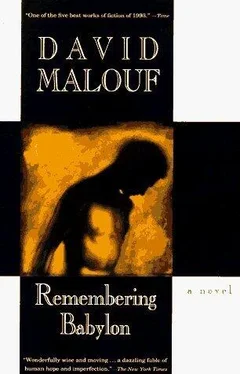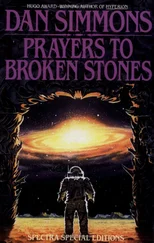Tries to hold it, the shadow; to make at least the memory of it last on his flesh, and cool and calm the furious activity all over the surface of him. But his mind lets the cloud slide away like everything else it has held. All that remains in his skull, behind the blind eyes, is sky, and that too burns, shakes out flame. Cloud after cloud rolls over, touches, cools, and is gone. Beyond hold.
The mob of naked women and gleaming, big-eyed children who found him washed up at low tide in their bay, stood with one foot set upon the other and clenched their brows.
What was it? A sea-creature of a kind they had never seen before from the depths beyond the reef? A spirit, a feeble one, come back from the dead and only half reborn?
The flesh was raw, covered with white flower-like ulcers where the salt had got in, opening mouths that as the soft water touched them lifted pale tentacles. Tiny crabs heaped and climbed over one another’s soft-shelled backs, and heaved and glittered. One of the women tried to drive them off. Seething, they rose up in waves from under him, tumbling out of the folds of bark he was wrapped in, and with the sighing of a million tiny claws as the sand grains slipped under them, wheeled in a cloud over the bubbling sand.
The creature’s eyes sprang open. They were of a milky colour; blank, maybe blind. The mob shifted closer.
The eyes were open upon something. Not us, they thought.
Not them, but some other world, or life, out of which the creature, whatever it was, seacalf or spirit, was still emerging. They started, expecting as they watched to see some further transformation. The eyelids drooped and flickered. Now, they thought. It is letting go of that other life. It sees us. Now. The mouth opened, revealing a swollen tongue. But no change occurred.
Very timidly, as if fearful of exposing themselves to impiety, or of setting off some change in the creature other than the one it was slowly working towards, they lifted the loose husk that covered it, and found the silvered skin, the belly with its familiar indentation and knot (a flutter of excitement swept over them), and as the last encrustation of crabs broke up and his sea-attendants left him, the white worm of his prick. Again they murmured one to the other but remained puzzled and drew back.
He watched them. Let them do what they would with him. What struck him was the smell they gave off; or maybe it was the air of the place. Animal, unfamiliar. What he thought was: I am lost again, more lost than ever. It is not what I expected.
What he had expected, beyond so much flame, after so many days of burning, was Willett, rising up in an odour of char, with his eyebrows ablaze and his scorched boots hanging from their laces at his neck. The disappointment of it was like tears in his throat and choked him.
One of the older women sent a younger one off, and when she returned it was with water that sloshed from a gourd. They wetted his lips with it. He moaned, clutched, set his teeth to the lip of the thing, gulping. He kept his eyes fixed on them over the rim and they leaned forward to see him drink.
A little later, he could not say how long, he was no longer at the sea’s edge, but in soft sand, in the shade of a shrub whose fan-like needles broke the light just inches from his face and fanned it with coolness. The huddle of women, chattering like birds, was moving away.
Later again he found himself in darkness not far from a fire where shadows flared. The smell of smoke pricked his nostrils — Ah, perhaps, after all!
The high treetops were filled with a buzzing which he thought the stars were making. How had he got here? Had someone carried him or had he dragged himself up the beach into the scrub, drawn by the sound of voices and the promise of company? For the voices he had heard were human. It was the humming breath of them, rising up in the clear night, that he had taken for stars.
After a moment, using his elbows, he began to push himself towards them and out into the firelight. Their many faces, touched with flame, turned towards him, mouths open, eyes staring, as the pale, wormlike figure inched towards them.
He squirmed into a sitting position and heard the gasp of their breath. Dropping forward, he raised himself on all fours; then, with an effort, staggering upright, held his hands out and began to whine in what he had learned, long ago, was a piteous manner — he did not think it would be less effective here than on the streets back home — and with a whole repertoire of gestures that were meant to engage and win them over, waggled his ears, pulled his mouth wide with a finger in each corner, producing at first only a kind of shocked silence in them, till the stillness was broken by a peal of laughter, then exploded in general hilarity.
They tossed him scraps, and fell still again as he sat with his head down and tore with his teeth at singed fur. Then he curled up just where he was and slept, and when he woke, all round him, under drifts of mist past the trunks of trees, they were preparing to leave.
He followed. At first at a distance, though one or two of them glanced back from time to time to see if he was still with them; then closer, till he made one of the loose mob of old folk, women mostly, who straggled in the rear.
They left a good space round him, but in a place where the forest thickened and it was almost dark, tried to elbow him off the track, then, when they saw that he was not to be got rid of, gave up. One old woman, with no sign of personal interest, as if he were a little white hairless thing that could not fend for itself, gave him a mouthful of seeds. Once again, half-fearful, they watched while he swallowed it. When they came to a halt at last and made camp, he claimed a place for himself in the second or third ring from the fire, and his neighbours, though wary, made no dispute.
So he began his life among them, doing what he had always done. It was all he knew. Since he had somehow found his way into the world, his object, like any other creature’s, was to stay in it and by any means he could. He had a belly to be fed. In the days that followed he winkled out a place among them, made himself small, scouted about for this or that one he might attach himself to, looked droll, looked pathetic, and when he could not get what he wanted that way, would dart in under the half-playful, half-timorous cuffs, grab what he could and gobble it down before he was stopped. He was not put off by the occasional bruise.
He was a child, with a child’s quick capacity to take things in and the street child’s gift of mimicry. They were astonished at the swiftness with which he learned their speech, and once a thing had been pointed out to him, how keen his eyes were. Relying on a wit that was instinctive in him and had been sharpened under harder circumstances than these, he let himself be gathered into a world which, though he was alarmed at first by its wildness, proved no different in essence from his previous one, for all that it was, day after day, hot tracks over stone, and insect bites, and nights when you had to creep in under logs while the rain slushed, and long spells between one bellyful and the next.
Watching out for it, and for himself, he got into his mouth as much of its fat and flesh as he could manage, its names too, its breath. What kept you alive here was the one and the other, and they were inseparable: the creature with its pale ears raised and stiffened, sitting up alert in its life as you were in yours, and its name on your tongue. When it kicked its feet and gushed blood it did not go out of the world but had its life now in you, and could go in and out of your mouth for ever, breath on breath, and was not lost, any more than the water you stooped to drink would cease to run because you gulped it down in greedy mouthfuls, then pissed it out.
Читать дальше












